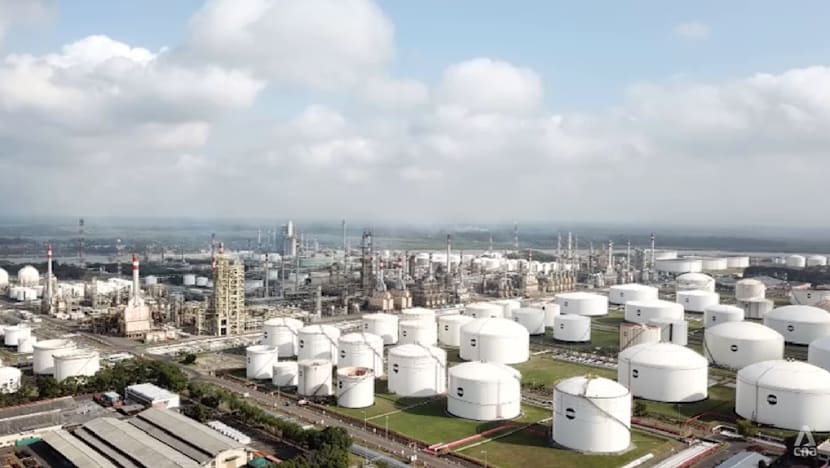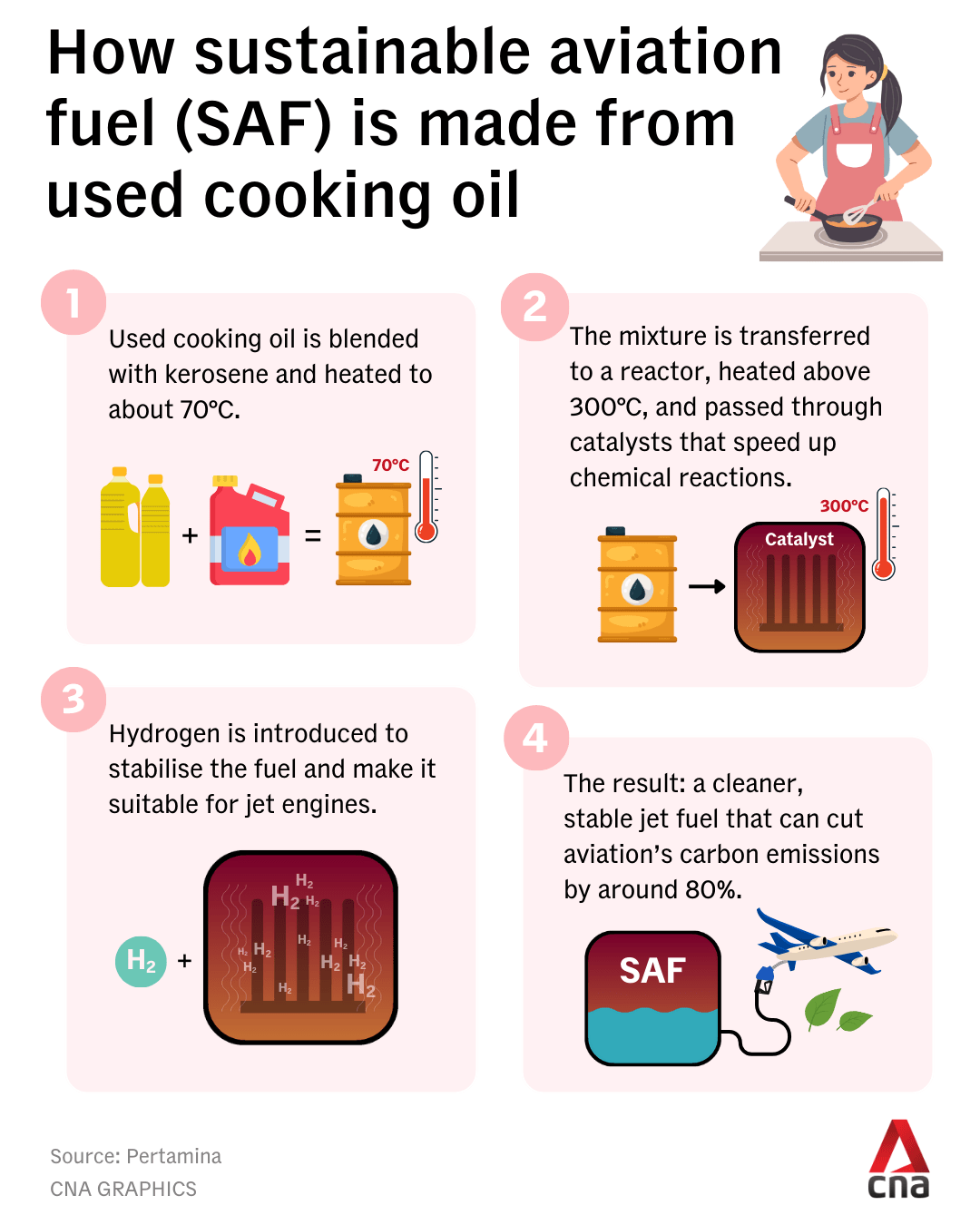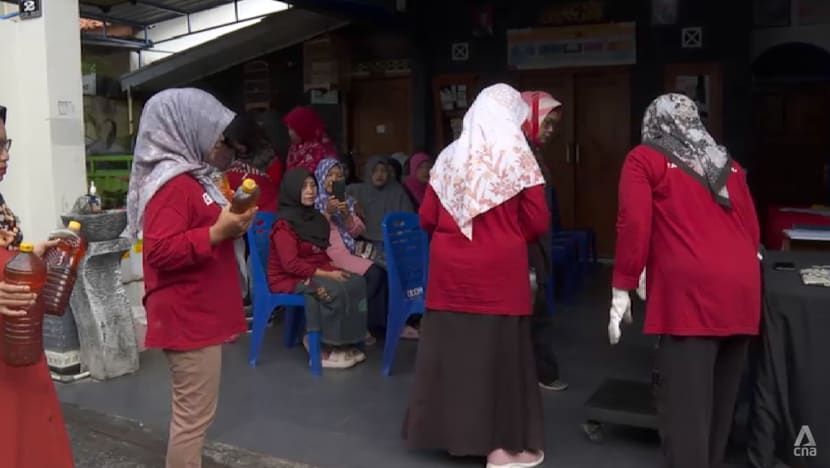Indonesia plans sustainable aviation fuel production boost amid high costs
Selling used cooking oil has become a side income for residents near Indonesia’s largest refinery, a vital supply link in the nation’s sustainable aviation fuel plans.

Pertamina’s Cilacap facility is the largest oil refinery in Indonesia.

This audio is generated by an AI tool.
CILACAP, Indonesia: Indonesia’s state-owned energy company Pertamina is ramping up efforts to produce sustainable aviation fuel (SAF) as part of the country’s drive to cut carbon emissions from air travel.
The company plans to expand SAF production capacity at its existing refineries and is exploring the possibility of building new green refineries.
Currently, SAF is being produced at Pertamina’s Cilacap refinery in Central Java, and the company is either developing or planning green refinery capabilities to make such fuel at its facilities in South Sumatra, Riau, West Java and East Kalimantan.
The Indonesian government aims to raise the national SAF blend mandate for international flights to 5 per cent by 2035.
At the recent United Nations climate conference (COP30) in Belem, Brazil, Indonesia said it aims to produce over 1 million kilolitres of SAF annually by 2030, with used cooking oil as a key feedstock.
TURNING USED COOKING OIL INTO JET FUEL
Pertamina’s Cilacap facility is the largest oil refinery in the country, processing 348,000 barrels of crude oil per day and supplying roughly a third of Indonesia’s fuel needs.
It is being developed into a green refinery to produce sustainable aviation fuel, and can yield about 1.4 million litres a day – roughly half the volume of an Olympic-size swimming pool.
About 3 per cent of that comes from used cooking oil.
The refinery converts the used cooking oil into SAF through several chemical processes.
The oil is mixed with kerosene, heated to around 70°C, then transferred to a reactor where it is further heated to over 300°C and passed through layers of catalysts, which trigger and speed up chemical reactions.
Hydrogen is added to stabilise the mixture.
The result is a cleaner fuel suitable for jet engines, while cutting aviation’s carbon footprint by up to 80 per cent compared to conventional jet fuel.

SCALING UP GREEN REFINERY CAPACITY
To increase Indonesia’s SAF output, Pertamina is working to raise the proportion of used cooking oil in its fuel blends.
Its engineers are also experimenting with catalyst improvements to increase production efficiency.
The current catalyst was developed by Indonesian scientists from Pertamina's technology innovation division in partnership with the Bandung Institute of Technology.
Developing a homegrown catalyst is part of a national initiative to reduce the country’s dependence on imported catalysts.
"Our research and development team is always trying to improve the catalyst so that the used cooking oil content can be increased to more than 3 per cent," said process engineer Novan Adhi Prakasa. "This can also be achieved by increasing the capacity and productivity of the green refinery unit."
Indonesia’s potential supply of used cooking oil is significant. The country uses about 6 to 7 million tonnes of cooking oil every year, said Pertamina’s deputy president director Oki Muraza.
“If we could collect just 20 per cent of that, like in developed countries, we would have a large amount of raw material – enough to supply the domestic industry.”

FROM KITCHEN WASTE TO CASH
Local communities are already contributing to this growing green supply chain.
In the Tegalreja district, near the Cilacap refinery, residents are selling their used cooking oil at local waste banks instead of pouring it down the drain. Each kilogram fetches around US$0.30.
“Used cooking oil is something every household has. Selling it adds to our income. Even if it’s just a little, it helps,” said Bartinah, a resident of KB Gadis village.
“It gives us motivation and hope that one day, the price could rise even higher, maybe up to 10,000 rupiah (US$0.60) per kilogram.”
Indonesia has a potential supply of around 1 million litres of used cooking oil annually, but about 95 per cent of it is exported to Europe and other parts of Asia.
Community collection initiatives could redirect more of that to domestic SAF production.
“In the beginning, we collected around 80kg to 100kg of used cooking oil a month. Now, it’s up to about 170kg,” said Sri Widowati, a coordinator at the Tegalreja Waste Bank.
PRICE SENSITIVITY REMAINS A CHALLENGE
Indonesia plans to introduce a 1 per cent SAF blend in its aviation fuel by 2027, but the high cost of production remains a major obstacle.
SAF can cost two to five times more than conventional jet fuel.
Industry experts say the government needs to step in to ensure that airlines’ use of SAF doesn’t end up driving up ticket prices.
“The Indonesian market for air transport is highly sensitive towards price. It’s so much so that the government has not allowed any price increase for tickets since 2019,” said Alvin Lie, chairman of the Indonesian Association of Air Transport Service Users.
“Now, the fact is that SAF is still expensive, so even a 1 per cent of SAF in the fuel will drive the cost up and inevitably the cost of air tickets will go up.”
Lie suggested that the government look into removing the 12 per cent value-added tax on aviation fuel and air tickets.
"If the government wants to progress with the use of SAF, the least (it) can do is abolish the value-added tax, both for air tickets as well as fuel for domestic routes," he said.
Despite these challenges, Indonesia’s ambition to become a regional leader in sustainable aviation fuel is gradually taking shape.
Real progress will depend on how quickly the country can scale up production and secure a steady supply of feedstock – the waste oils and other organic materials that are refined into sustainable fuel.
Indonesia’s transport sector accounts for around 22 per cent of the country’s energy-related carbon dioxide emissions, according to the International Energy Agency.
For now, SAF remains central to Indonesia’s net-zero emissions goals – and could be its ticket to cleaner, greener skies.


















